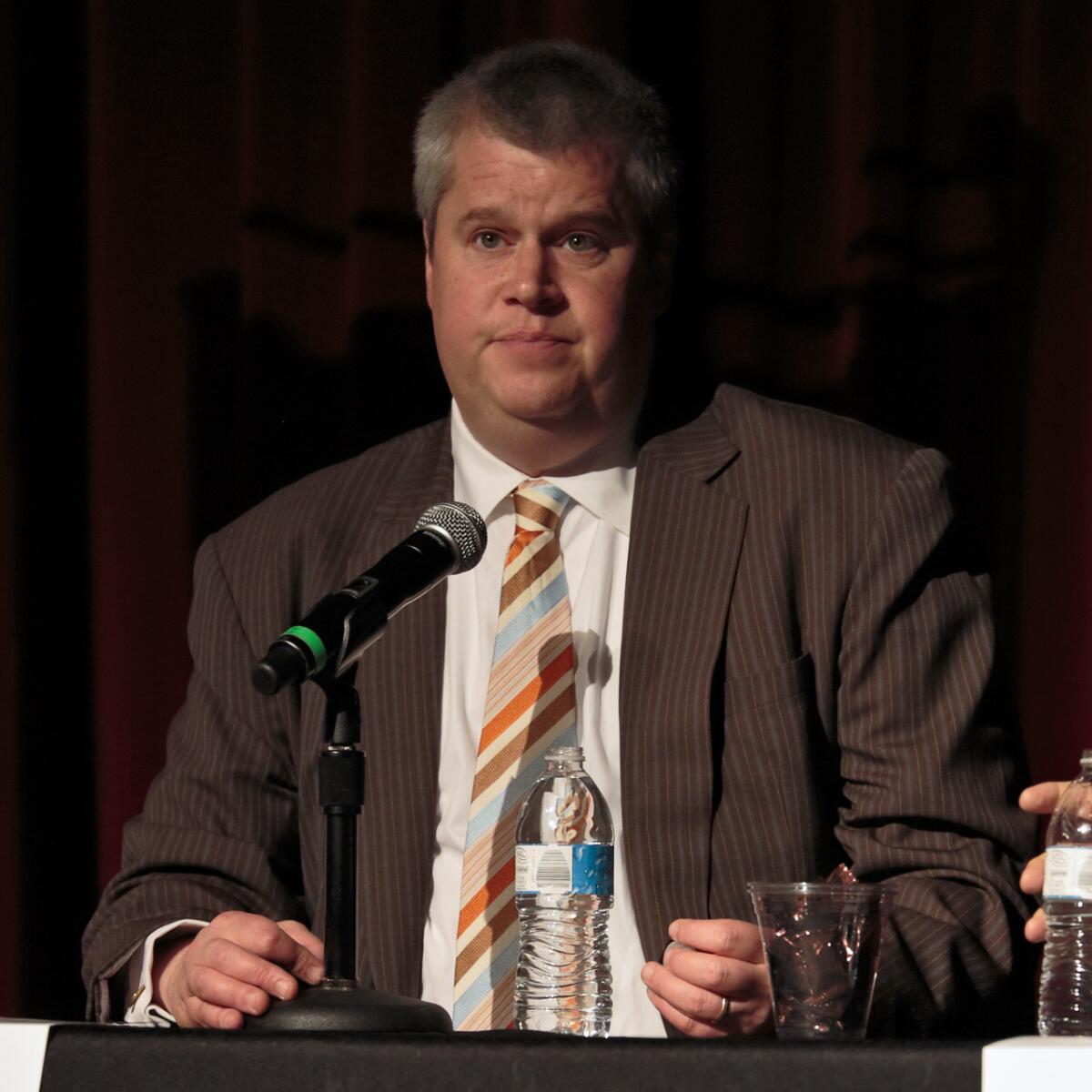Lemony Snicket: ‘a strange writer in whom nobody took any interest’?

- Share via
As he has done so often in print under his pseudonym, Lemony Snicket, the writer Daniel Handler (“A Series of Unfortunate Events” and “All the Wrong Questions”) doled out sage life advice to fans of all ages Sunday during a chat with fellow author Ransom Riggs (“Miss Peregrine’s Home for Peculiar Children”) at the L.A. Times Festival of Books.
After telling a story about meeting in a bar with the agent who would agree to represent the gothic “Series,” Handler reminded himself that there were probably children present. “You should never, under any circumstances, drink an alcoholic beverage,” he stated with his trademark faux-severity, which plays as well on the stage as on the page. “Never live your life in such a way that you have to regret anything.” He paused for an eye blink. “That’s sound.”
To a young boy who said during the Q&A period that he and his family liked “A Series of Unfortunate Events,” Handler had even sterner words: “You need to think about what sort of family enjoys reading about terrible things happening to children over and over again. I think you should seriously consider running away from home.”
FULL COVERAGE: Festival of Books
“Is that the worst advice you’ve ever given?” wondered Riggs.
“No,” Handler replied. Although Handler was ostensibly the subject of the interview, Riggs seemed poised to steal the afternoon with his humorously glum introduction: “If you’re here to pass an entertaining and educational hour, you’re in the wrong theater.”
He welcomed audience members to leave for a nearby booth where they could find “balloon animals wearable as hats” instead. Nobody budged. Handler -- an unassuming-looking 43-year-old in a tan suit, with short gray hair, plump cheeks -- betrayed little expression during Riggs’ remarks.
But when Riggs spoke of the large audience as being impressive “for L.A.,” Handler, still wearing a poker face, quickly seized comic control: “L.A. has a complex about apologizing for its book society. There are writers here who produce gorgeous work, and people who read, and there are great book festivals here. Other cities don’t apologize for them, they just have them. It’s fine, Los Angeles. The rest of the world forgives you for the Kardashians. We’re not mad.”
As the hour progressed, he exhibited a facility with the one-liner that would shame a professional comedian. Of Bill O’Reilly, he commented: “He has his own ‘Factor,’ so that’s great for him.”
Of moving to Manhattan in his youth: “It’s a great plan if you have no money, because everything is free there.”
Of an early reading in Lansing, Mich.: “If you have the opportunity, you should really visit, especially during the sleet season, which is beautiful.”
INTERACTIVE GAME: How to be a writer
When an audience member mentioned certain “frustratingly unsolved mysteries” in his work, he rejoined smoothly, “Thank you, you flatter me.” Handler’s answers to Riggs’ questions about his life and career also reflected the playfully dark tone that characterizes his writing.
As a 6-year-old, Handler’s parents told him, he once said he would like to be “an old man who lived at the top of a mountain giving advice.”
“So you’ve achieved that,” Riggs replied. He did always want to write, Handler went on to say, citing “the slight alienation day in and day out brought to you by the ordinary world” that characterizes people who live most deeply in books.
But he always assumed he would be “a strange writer in whom nobody took any interest.” Like Riggs, he was an admirer of Edward Gorey as a child, as well as “any writer who occupies a world of his own: Henry Darger, Terry Gilliam ... Miley Cyrus.”
Asked why the “Series,” which takes such relish in inflicting terrible things on innocent children, is so popular, Handler surmised that the travails of the Beaudelaire children reflect children’s actual experiences of life: “Children have a very keen sense that they can come home and have the worst news. And as a child, wherever you go, people are lying to you.”
On a rare serious note, he mentioned that many of the young fans who write to him have lost at least one parent and have found his stories comforting. Handler has a way of dancing around serious questions. He made fun of himself for replying to questions about his stylistic choices with, “It charms me.” He described his writing process as “a cycle of despair with occasional bursts of happiness ... which charms me.” But fans looking for serious answers were left with the consolation of the balloon animal hats.
One reader asked him about the time period in which his work is set. “I’m curious about this too,” said Riggs, a professed fan. “It begins in the morning,” was Handler’s straight-faced response.
More to Read
Sign up for our Book Club newsletter
Get the latest news, events and more from the Los Angeles Times Book Club, and help us get L.A. reading and talking.
You may occasionally receive promotional content from the Los Angeles Times.










